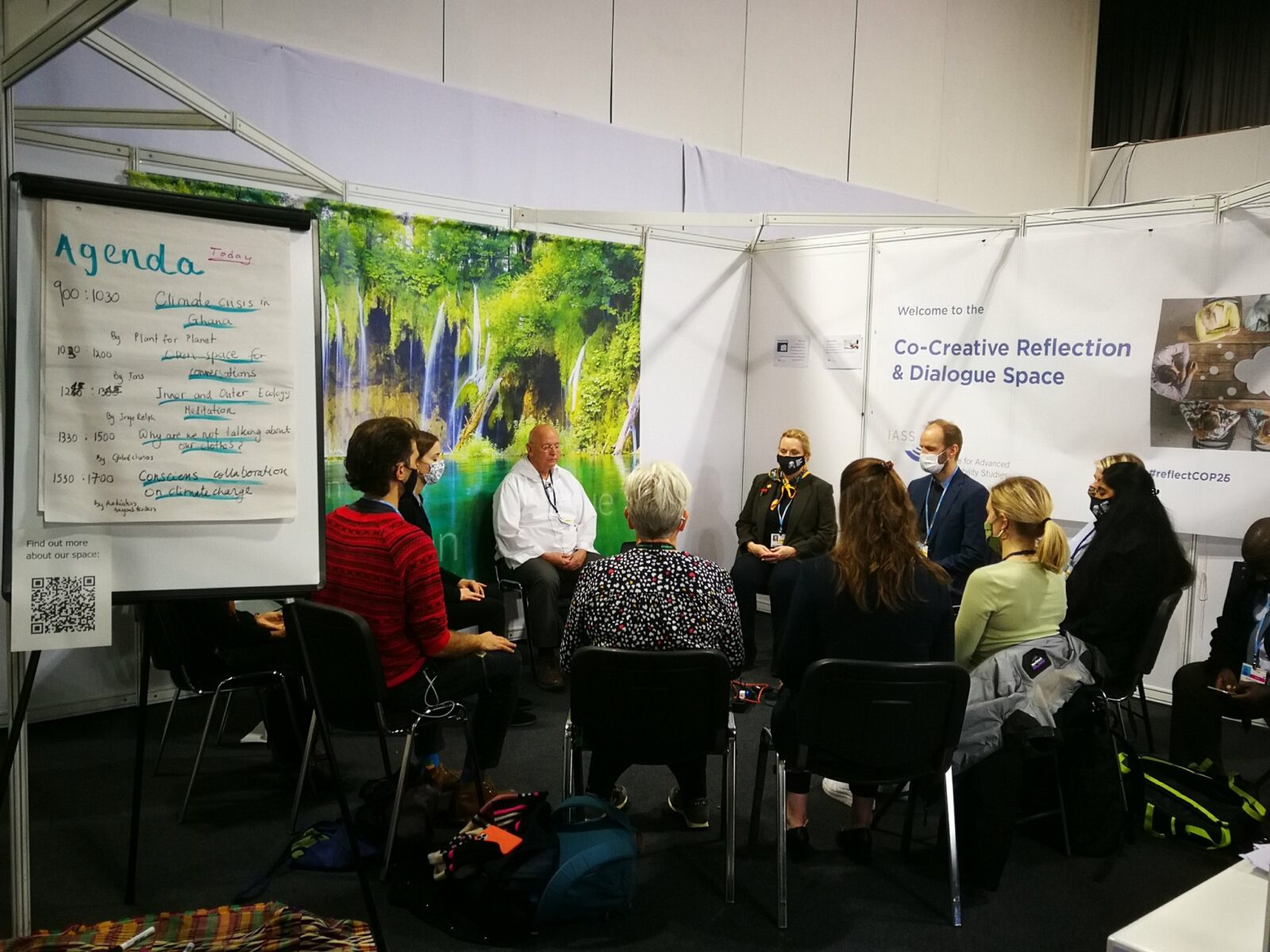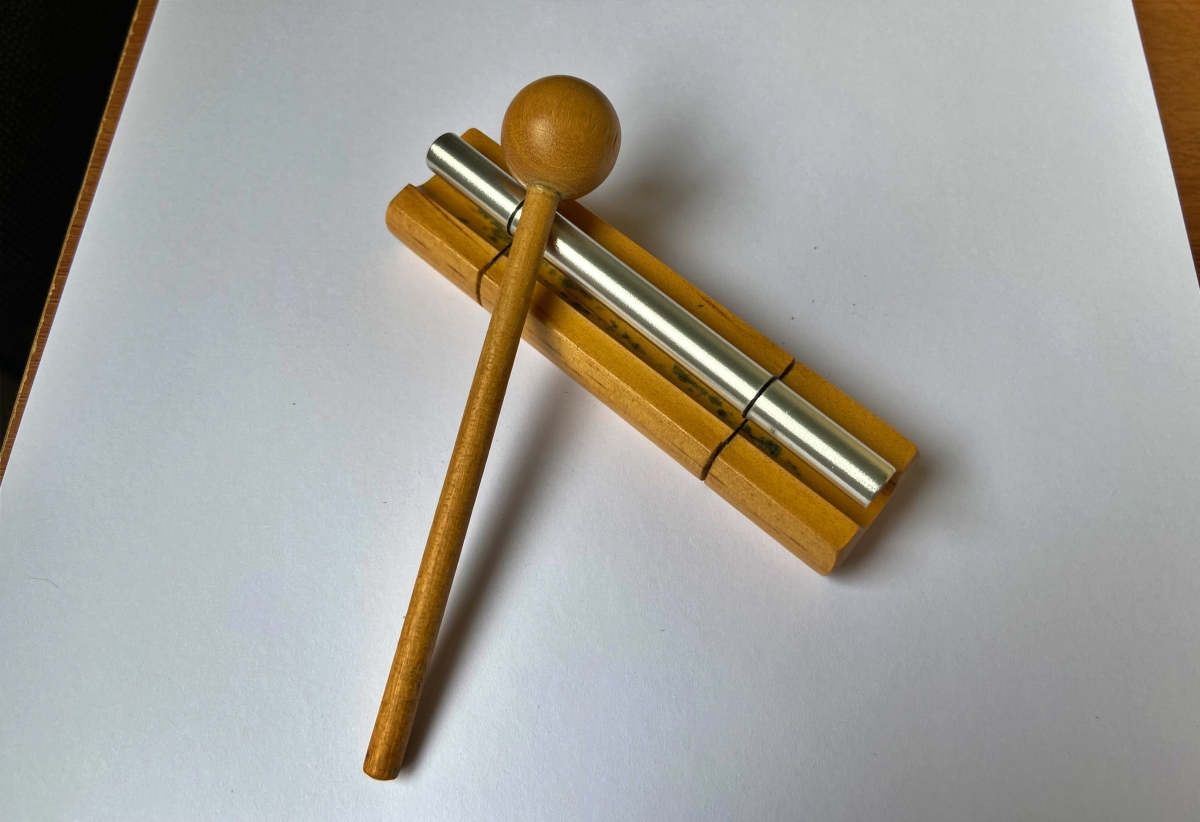As I passed through security at the Exhibition Hall my small backpack caused commotion. I was asked if I had a blade inside. When I showed them my little meditation bell – a six inch hollow metal tube, with the wooden ringer tucked into the wood base – he looked even more suspicious and asked what it was. The easiest way to show was to use it so I removed the stick and sounded the bell. I won’t say the whole of the conference centre fell wondrously silent but at least he looked relieved and waved me through.
To any meditator the purpose of this little thing would have been obvious. If you don’t know, you don’t know; and lack of knowledge creates fear. Many of the stalls and booths around the exhibition space display inspiring, brilliant technological innovations: humanity at its best. At lunch I discussed a solar energy plan for the needs of Bonnevaux and learned things I hadn’t known and understood options that were shrouded in science before. I wondered if my small non-digital and misunderstood technology for timing meditation might play a role to play in releasing the consciousness needed to empower the better angels of human nature.
During my talk, the din of the hall, like the roar of traffic on a busy highway with thousands of simultaneous conversations colliding, seemed to exemplify the mind at the start of a meditation session. After the shared silence someone said how amazing it was to be able to meditate even under these conditions and afterwards how different the noise felt. It was still there but less of an opponent. This led us to discuss if a huge convention like this could be imagined and handled differently.
We have become a culture of meetings. We meet online or in person to discuss everything and often the final decision is to have another meeting. Being decisive requires faith in ourselves and courage in face of possible failure. COP is not a meeting about meetings but about decisions. There is not much time left for the planet but we are still scared of being decisive and unified. There are far fewer people who deny climate change but the new deniers are the delayers. Faith and courage and trust, essential of real choice are at a low ebb.
Of course, meditators would say, there should be more meditation at this kind of event and they will sound well-intentioned but, well, unlikely to achieve it. Yet for those who recognise what the bell is for – and know what the experience of silence can mean for better communication and unity of purpose – it does make sense. The opportunity to improve our culture of endless meetings is looking more realistic. Is it really so Idealistic to imagine a better world where it’s normal – because it’s effective – where every meeting begins with a few minutes of silence? Or for angrily polarised argument to be defused by suspending and restarting the conversation with the power of attention restored?

The environmental crisis, like Covid, is a problem in itself calling for specific solutions. Humanity is ingenious. Nature, of which we are not observers but participants, has an ingenious self-healing capacity beyond our understanding but that we experience continuously. Last night I came back from COP to take part in the last of Barry White’s sessions on Health which have enriched and enlightened this year for so many who followed his series. With the climate crisis so present, it was an opportunity to understand better what healing means. To conclude his model of health, Barry summarised it with memorable and profound simplicity. He distinguished between superficial health and deeper health. Pure attention is healing. Attention facilitates deeper healing of the patient and the clinician. Healing is relational. Attention advances the common human goal of deeper health but distraction misses the mark.
If this can be taught by a contemplative haematologist it can surely be applied to all problems. Why is it not more mainstream? But it is rapidly becoming so. Listen, even amid the din of our communication media and you will hear notes of this wisdom. Once heard they become stronger than the din: ‘the hope for the healing of the world lies in the greatest number of wise people’. The role of communities like ours, working with others in the same vineyard, is essential to make this happen.
I was moved recently to hear from a religious leader who meditates. He shared with me his near sense of despair with the kind of God-language he was expected to collude in. Speaking of God in ways that put God on the outside, turning Him into a potentate rather than revealing Him as a creating and loving power makes God a tribal totem. It is, after all, not only large convention centres that are so noisy they make communication almost impossible. It is also our churches, mosques, synagogues and temples. Our global crisis is calling forth a new kind of religion, using words to reveal the silence uniting us, healing division, and liberating the better angels of our nature.
The message in the air here is hopeful, full of resilience and optimism in the face of dire difficulty. So, it is not a tradeshow, although it looks like one, but a gathering of the best humanity can offer. Forget the decor and the organisation. Feel the hope but also the pervasive anxiety that we need something else to make it work. It isn’t politicians, bankers, scientists or activists alone who can turn it around. It also needs a decisive push and pull from deep within our nature reintegrating us to the silent presence within us that is our unity. Maybe that little bell, that is not a blade, can be trigger this.






